The International Rice Research Institute (IRRI), through its capacity-building arm, IRRI Education, held a three-day training workshop on the Introduction to the CGIAR Innovation Packages and Scaling Readiness (IPSR) from September 18 to 20, 2024, at IRRI Headquarters in Los Baños, Laguna, Philippines. The CGIAR IPSR course aimed to improve the efficiency and impact of research for development programs by encouraging critical reflection on how ready innovations are for scaling.
IRRI gears staff for effective scaling cross-CGIAR initiatives to achieve global goals
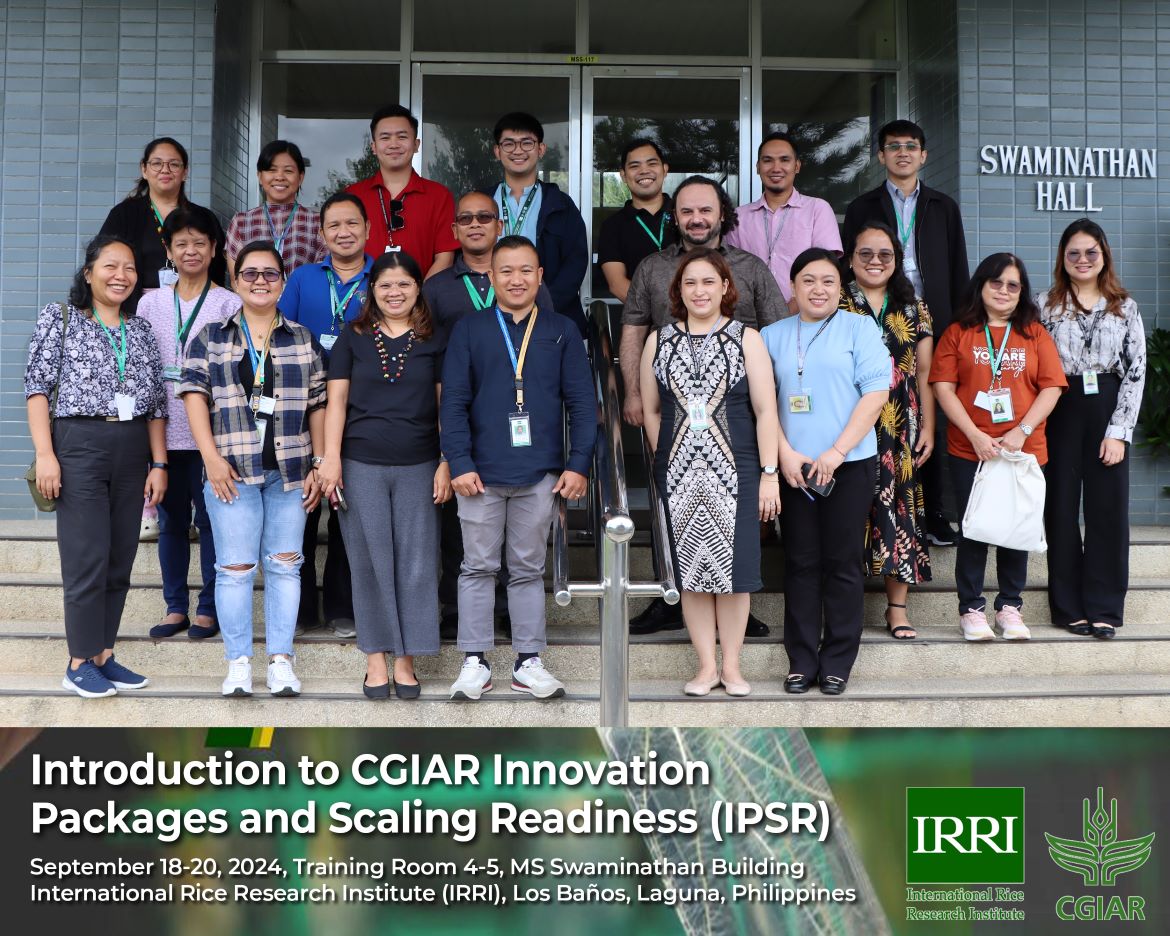
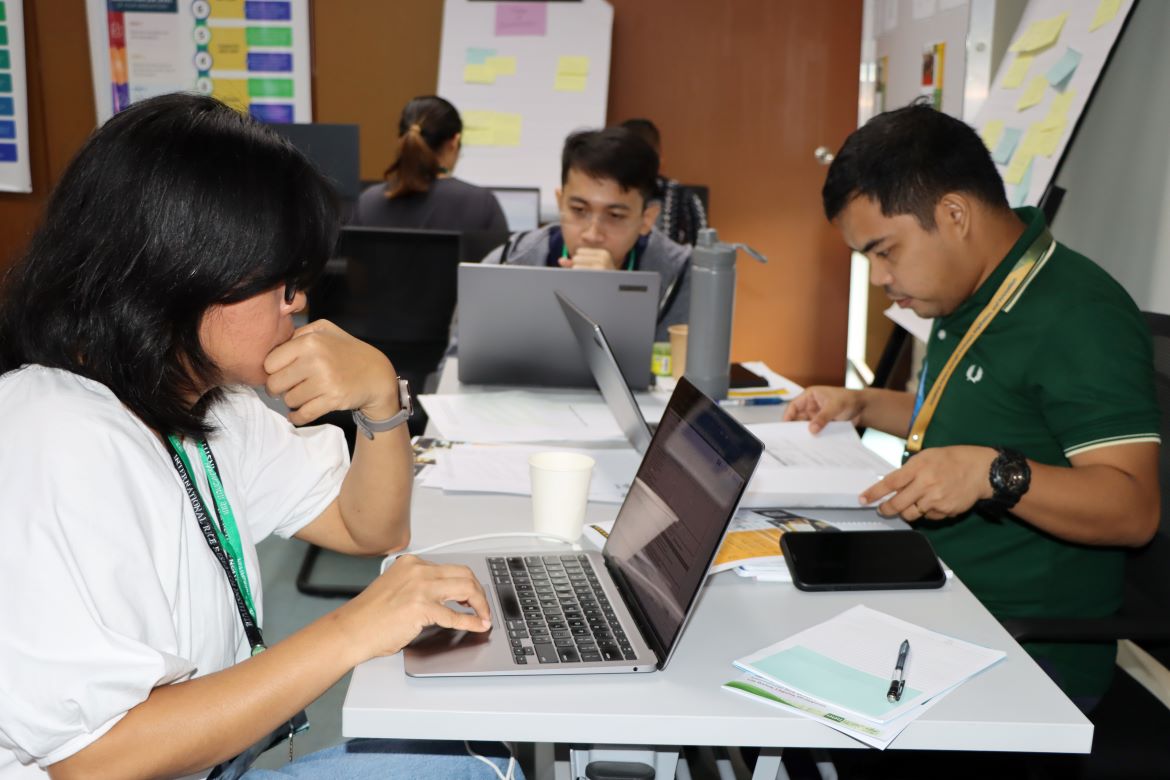
Participants are trained to design, implement, and monitor scaling strategies for cross-CGIAR initiatives. Project performance is tracked using the principles and tools of Scaling Readiness, a framework developed by CGIAR and led by Wageningen University and the International Institute of Tropical Agriculture (IITA), to support decision-making on the scaling of innovations. Through this, project members can identify bottlenecks, make informed decisions, and make strategic solutions thereby improving prospects for success at scale. Standardization of such processes allows initiatives to also track their contributions to achieving Sustainable Development Goals (SDG).
IRRI Human Resource Partner for Learning and Development Angelica Valerie De Jesus, emphasized the need to put knowledge into action, urging participants to take the insights they gained back to their workplaces to share with others. She hoped this initiative would lead to meaningful change for IRRI, in partnership with CGIAR, in fulfilling its mission.

“Beyond developing innovations, we should also look into how these will benefit the institution’s main beneficiaries – the farmers.”, shared IRRI’s Project Development and Deployment Manager Rowena Castillo. She hoped this training would not be the last and that this initial encounter would lead to deeper learning opportunities in the future.
Over the course of three days, 13 IRRI employees involved in various CGIAR Initiatives engaged in sessions that focused on key topics such as the fundamentals of scaling innovation, innovation profiling, and scaling readiness. They participated in hands-on activities to assess innovation readiness and develop scaling strategies. Notable sessions included a presentation and panel discussion on the strategies and lessons from PhilRice’s scaling efforts, led by Dr. Jaime Manalo IV, Scientist II and Head of Socio-economic Division, along with workshops facilitated by Dr. Murat Sartas, Innovation, Scaling, and Impact Management Scientist for CGIAR and Wageningen University. The training culminated in group presentations, allowing participants to apply what they had learned and share their insights with one another.
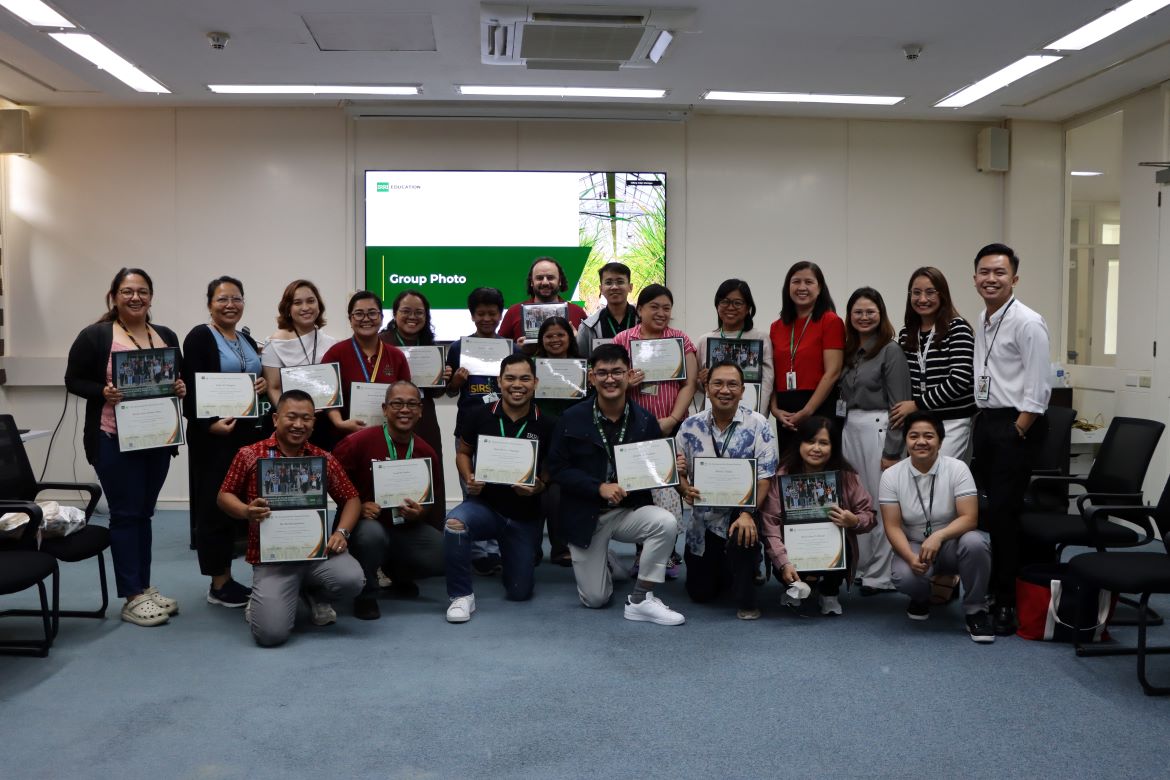
Ms. Elizabeth Alcachupas, Monitoring and Evaluation Officer, described the training as “an incredibly transformative experience.” She highlighted, “The training was not only well-structured but also deeply insightful, helping me develop skills in using the tools available on the CGIAR website. The trainers were knowledgeable and approachable, ensuring that complex concepts of scaling and innovation were easy to grasp through practical examples. I highly recommend IPSR training to anyone.”
Ms. Krystle Ambayec-Dino, Partnership and Capacity Building Coordinator, also expressed her satisfaction with the course, stating, “This course provided me with the knowledge and skills to better identify innovations, profile their readiness, and effectively package them for scaling up to the end users, thereby enhancing our efforts in research for development at IRRI.”
Following the success of the program and positive feedback from participants, the training team is exploring the possibility of offering the course again next year.
Learn more about this training course and other programs offered by IRRI Education at education.irri.org
IRRI Hosts Training Workshop on Self-Sufficiency, Food Security, and Agricultural Transformation
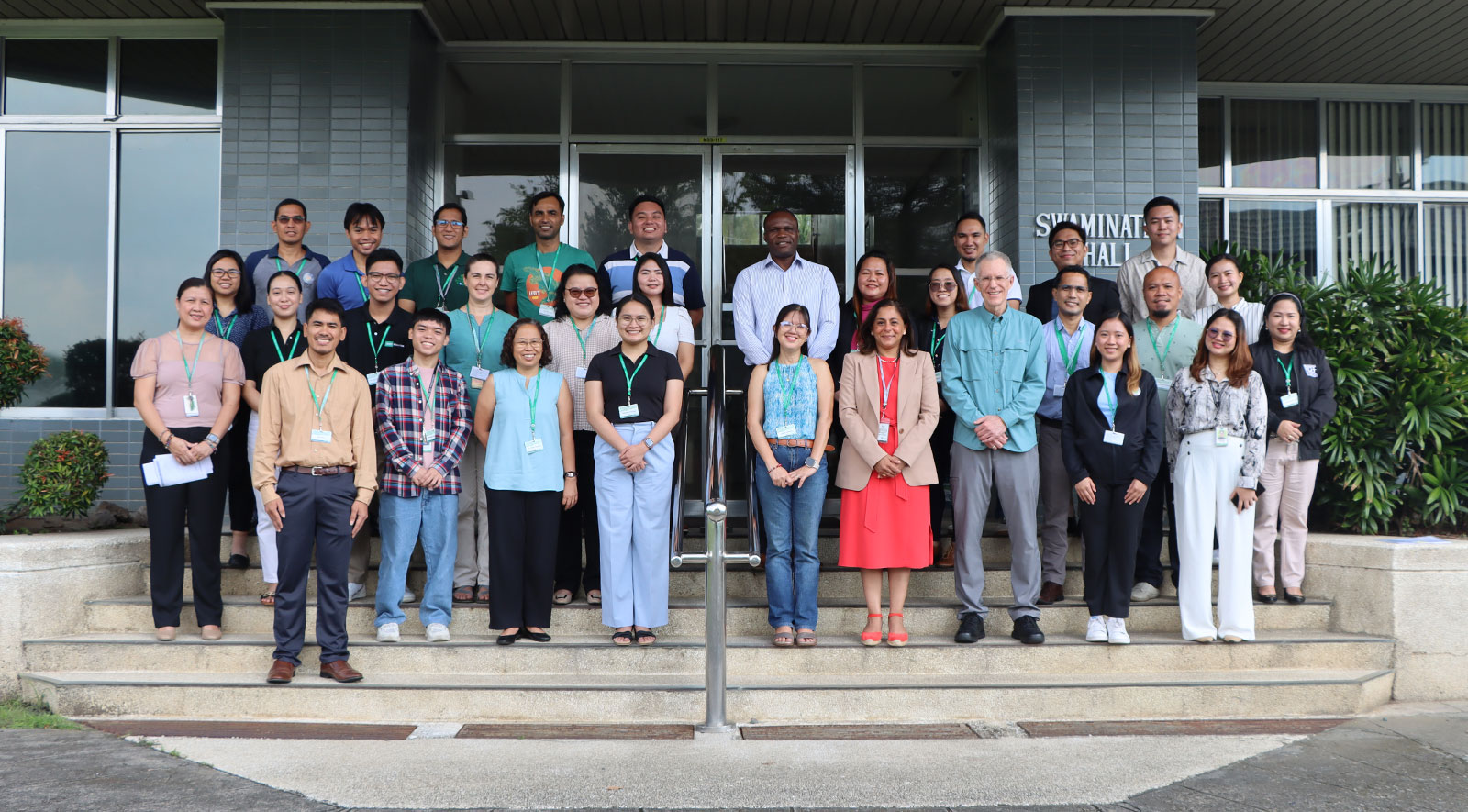
The International Rice Research Institute (IRRI), through IRRI Education as its capacity development vertical, hosted a three-day training workshop on Self-Sufficiency, Food Security, and Agricultural Transformation from September 10 to 12, 2024. The training aimed to enhance understanding of food security and self-sufficiency and explore policy approaches for achieving these goals.
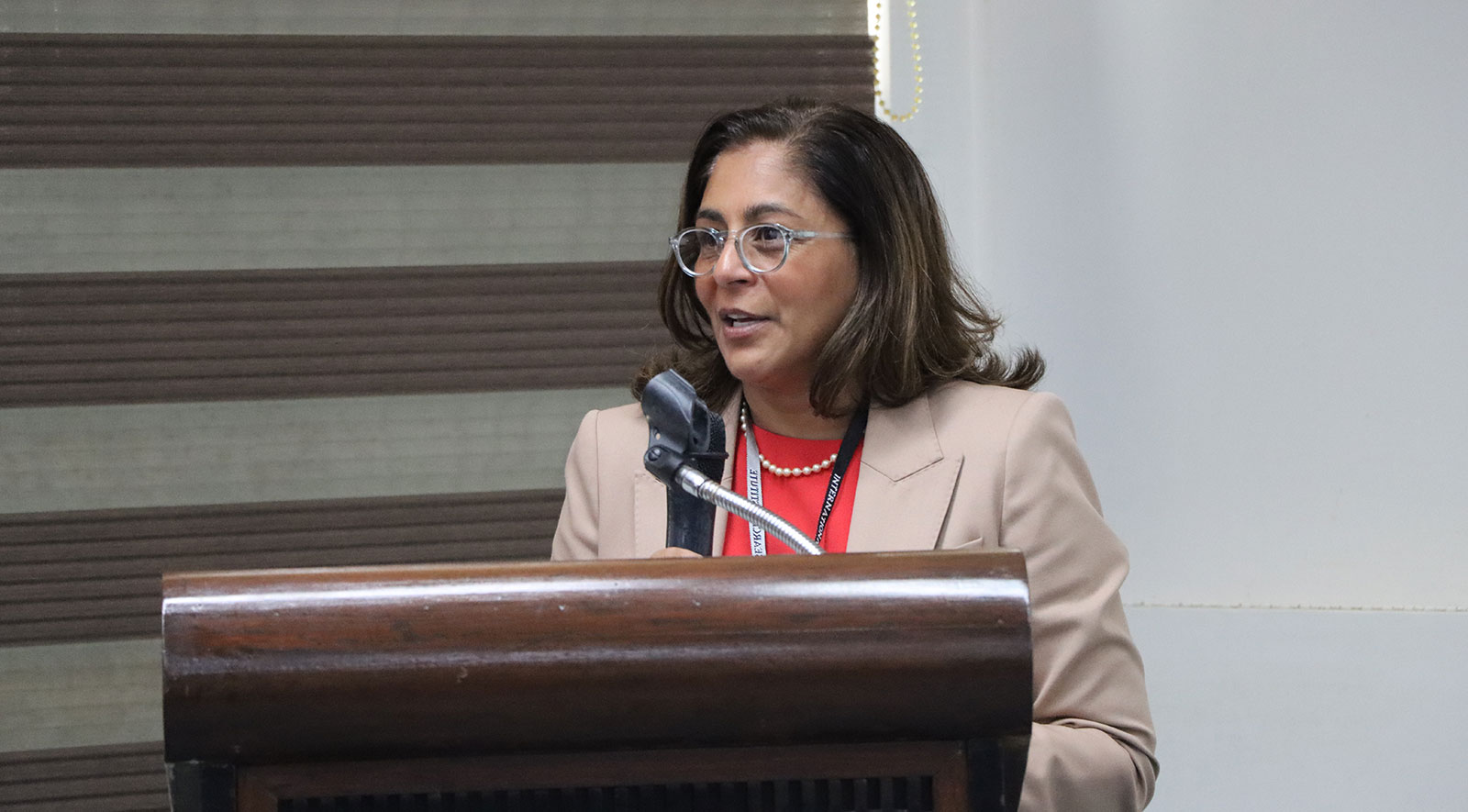
“We are excited to finally host this program, a vision that began in 2019 that aims to provide participants with a deep understanding of the key concepts, policies, and trade-offs that shape food systems around the world,” shared IRRI Education Head Dr. Anilyn Maningas. IRRI Director General Dr. Yvonne Pinto emphasized the importance of the course in addressing current food security challenges, highlighting the interplay between technology and policy. “Ensuring that policies have the right feedback and we are responsive to that feedback is critical,” she stated.
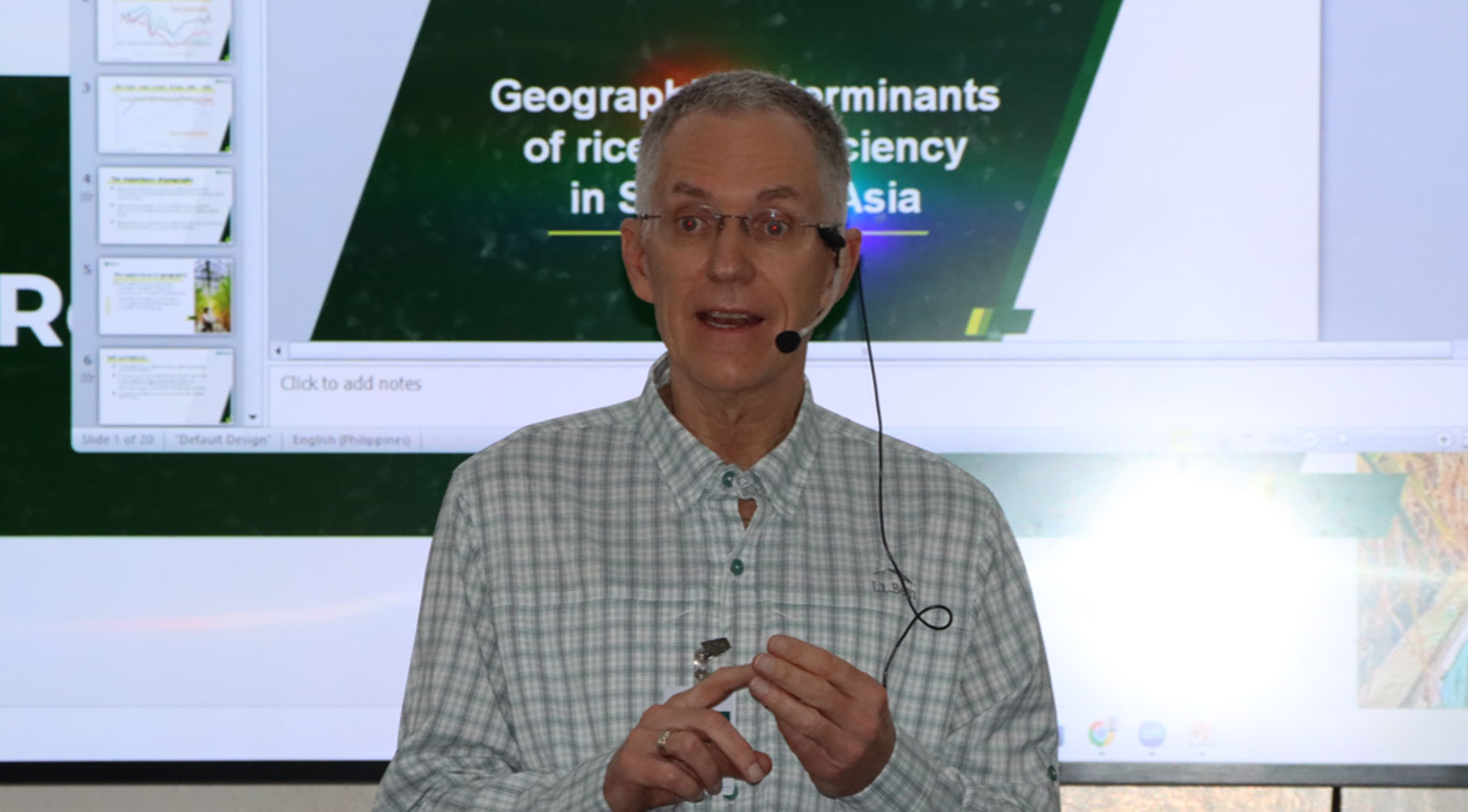
Key sessions included a presentation by IRRI Senior Scientist II for Agricultural Economics Dr. Valerien Pede and Senior Economist for Food Policy Analysis Dr. David Dawe on food security and self-sufficiency. A panel discussion featuring Southeast Asian Regional Center for Graduate Study and Research in Agriculture (SEARCA) Director Dr. Glenn Gregorio, Philippine Institute for Development Studies (PIDS) Senior Research Fellow Dr. Roehlano Briones, Former Private Sector Member, Monetary Board at Bangko Sentral ng Pilipinas (BSP) Dr. Bruce Tolentino, and Former Member of the Asian Development Bank Institute (ADBI) Advisory Council Dr. Fermin Adriano. The panel examined the Philippine Rice Trade Liberalization (RTL) law, noting its role in lowering rice prices for consumers while reducing input costs for farmers and the importance of ensuring competition among rice traders.
The final day featured Dr. Dawe and International Food Policy Research Institute Emeritus Fellow Dr. Howarth Bouis as the main resource persons. Dr. Dawe provided in-depth insights on agricultural and structural transformation, while Dr. Bouis focused on the importance of agricultural policy in promoting nutrition security.
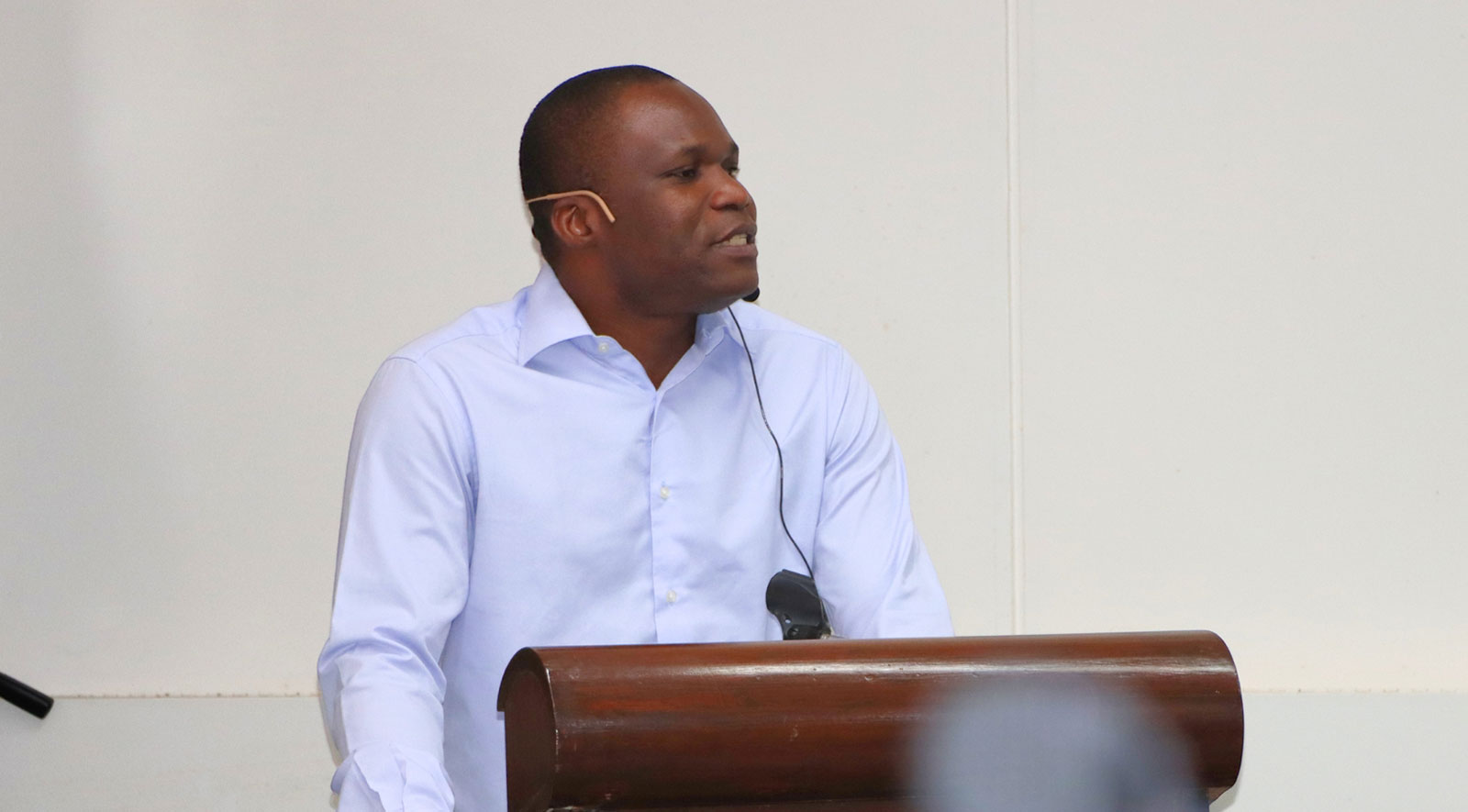
The event brought together 23 participants from IRRI, DA-PhilRice, the Department of Finance, the Department of Agriculture, Caraga State University, and the International Maize and Wheat Improvement Center (CIMMYT). A post-course assessment will be conducted to gauge the effectiveness of the training workshop and to inform potential improvements for future offerings.
Learn more about this training course and other programs offered by IRRI Education, visit education.irri.org
Enhancing Capacities: IRRI Trains Crop Breeders from Asia and Africa
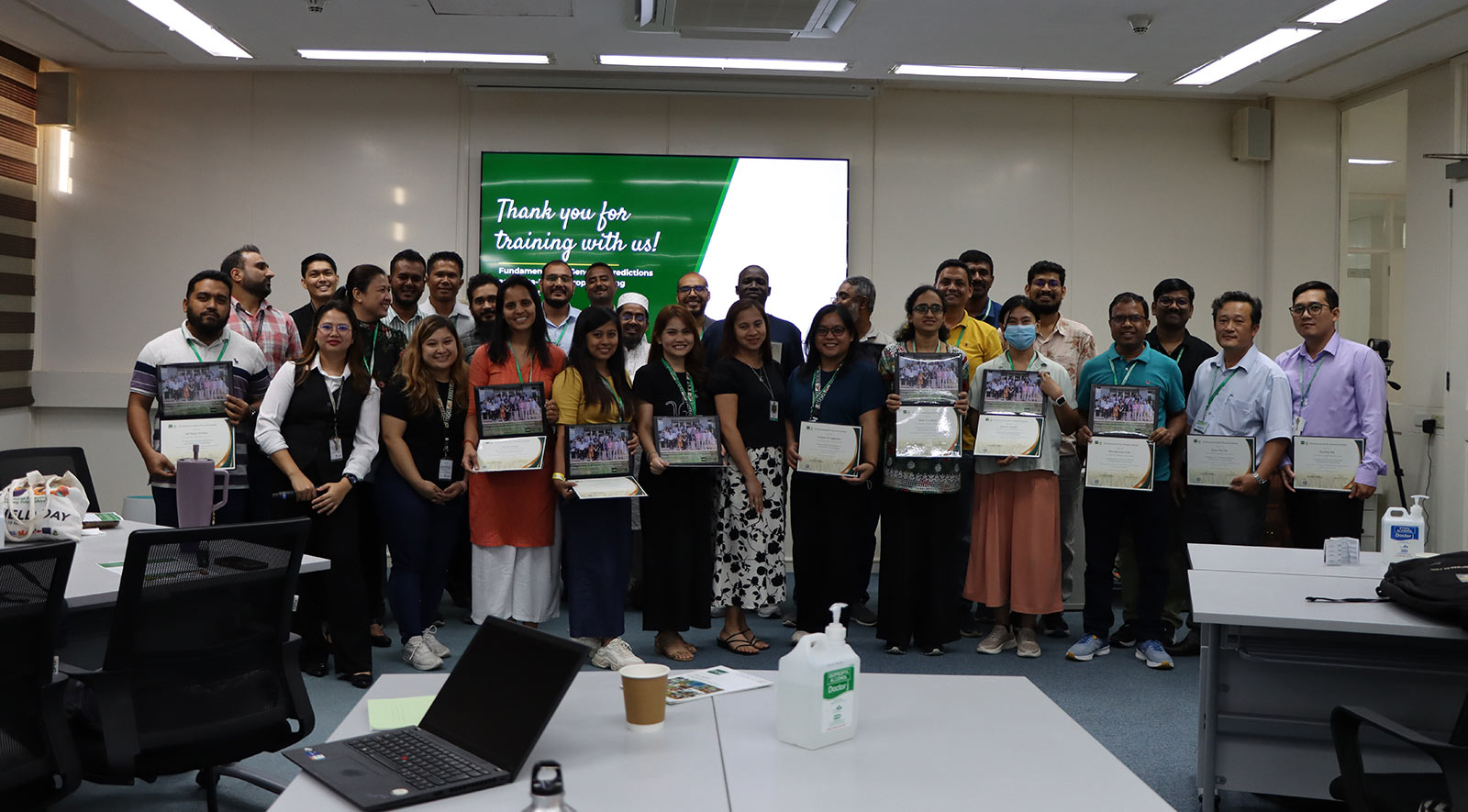
In an effort to share the current research, knowledge, and practices, IRRI Education, the educational and capacity building arm of the International Rice Research Institute (IRRI), recently organized a comprehensive training on genomic prediction and data-driven crop breeding. Held from August 5 to 9, 2024, the training attracted a diverse group of participants from Asia and Africa, to learn about the genomic selection and other data-driven strategies in crop breeding.
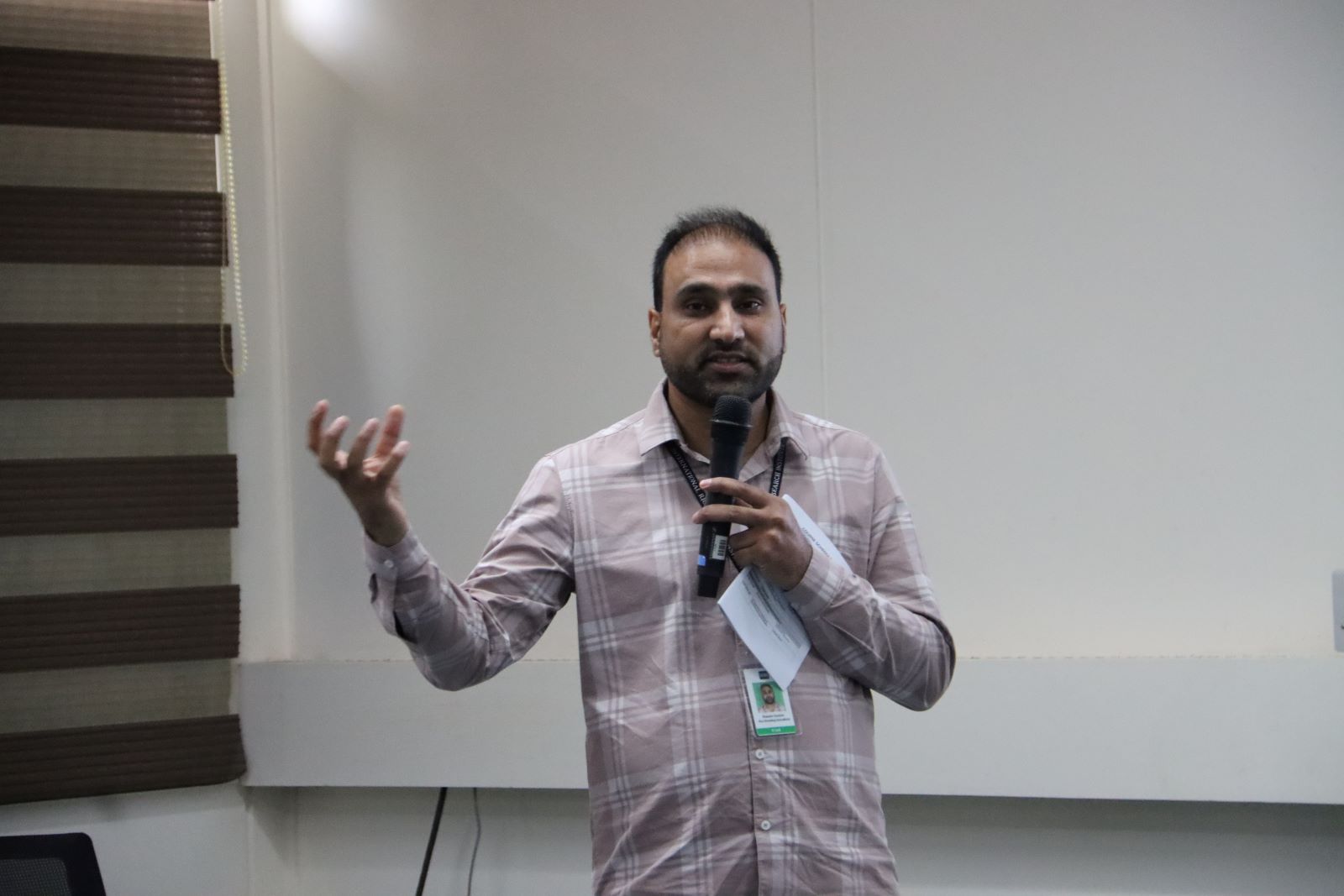
This training course was conceptualized and initiated by IRRI’s scientists Dr. Waseem Hussain, IRRI’s Senior Scientist I in Plant Breeding, Dr. Eduardo (Giovanny) Covarrubias-Pazaran Senior Scientist II – Quantitative Genetics and Biometrics; Dr. Mahender Anumalla, Scientist I – Breeding Long Duration Rice; Dr. Parthiban Thathapalli Prakash, Scientist I – Breeding Optimization; Ms. Leilani Nora, Specialist – Statistics; and Ms. Alaine Gulles, Lead Specialist – Biometrics and Breeding Analytics It aimed to integrate knowledge in quantitative genetics, predictive breeding, and innovative breeding methods. This includes a comprehensive understanding of quantitative genetics and statistical genomics, enabling participants to apply these tools for genomic selection effectively. A total of 20 scientists and crop breeders from India, Ethiopia, Bangladesh, Philippines, Laos, Vietnam, Cambodia, Senegal, and Nepal participated in this 5-day course.
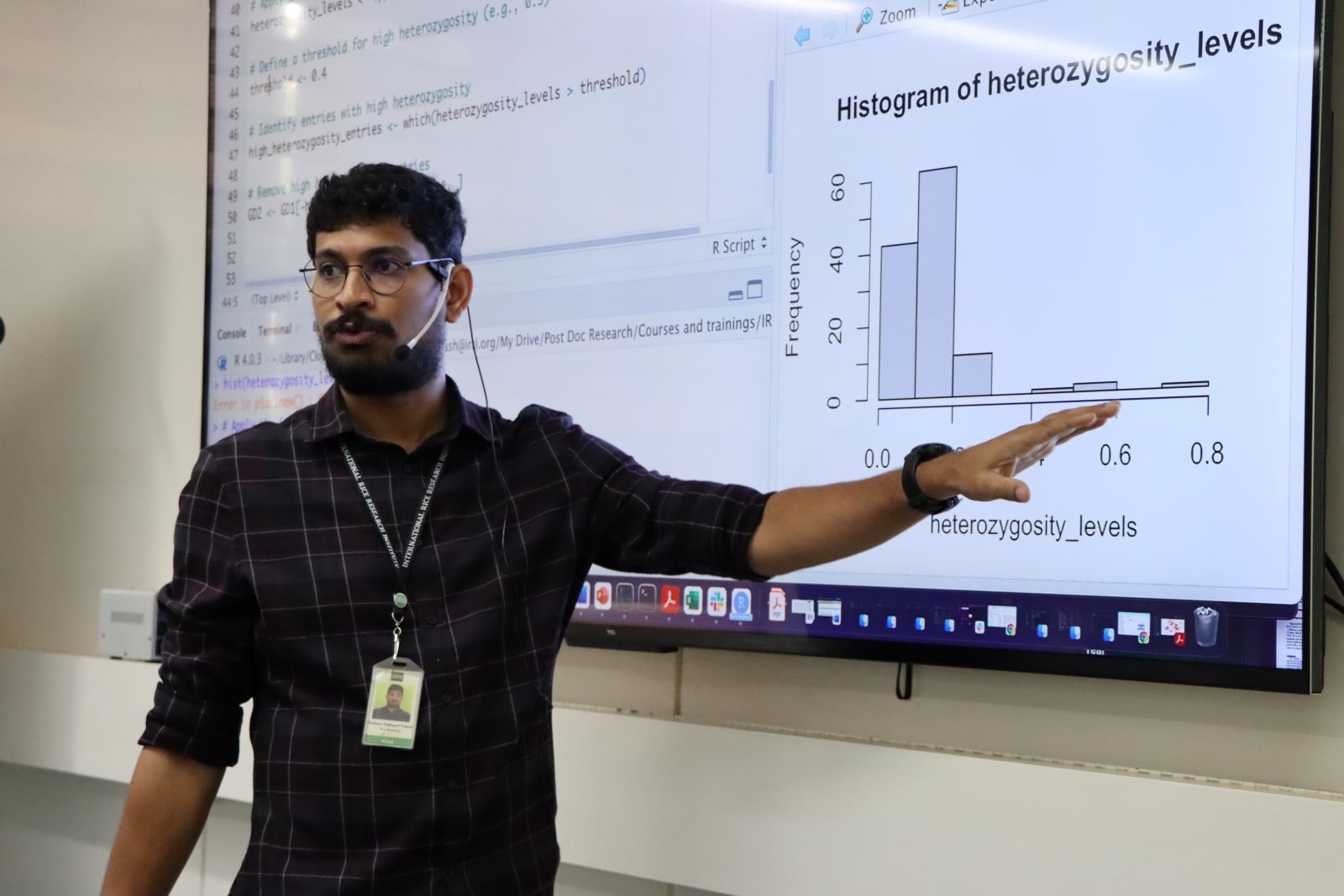
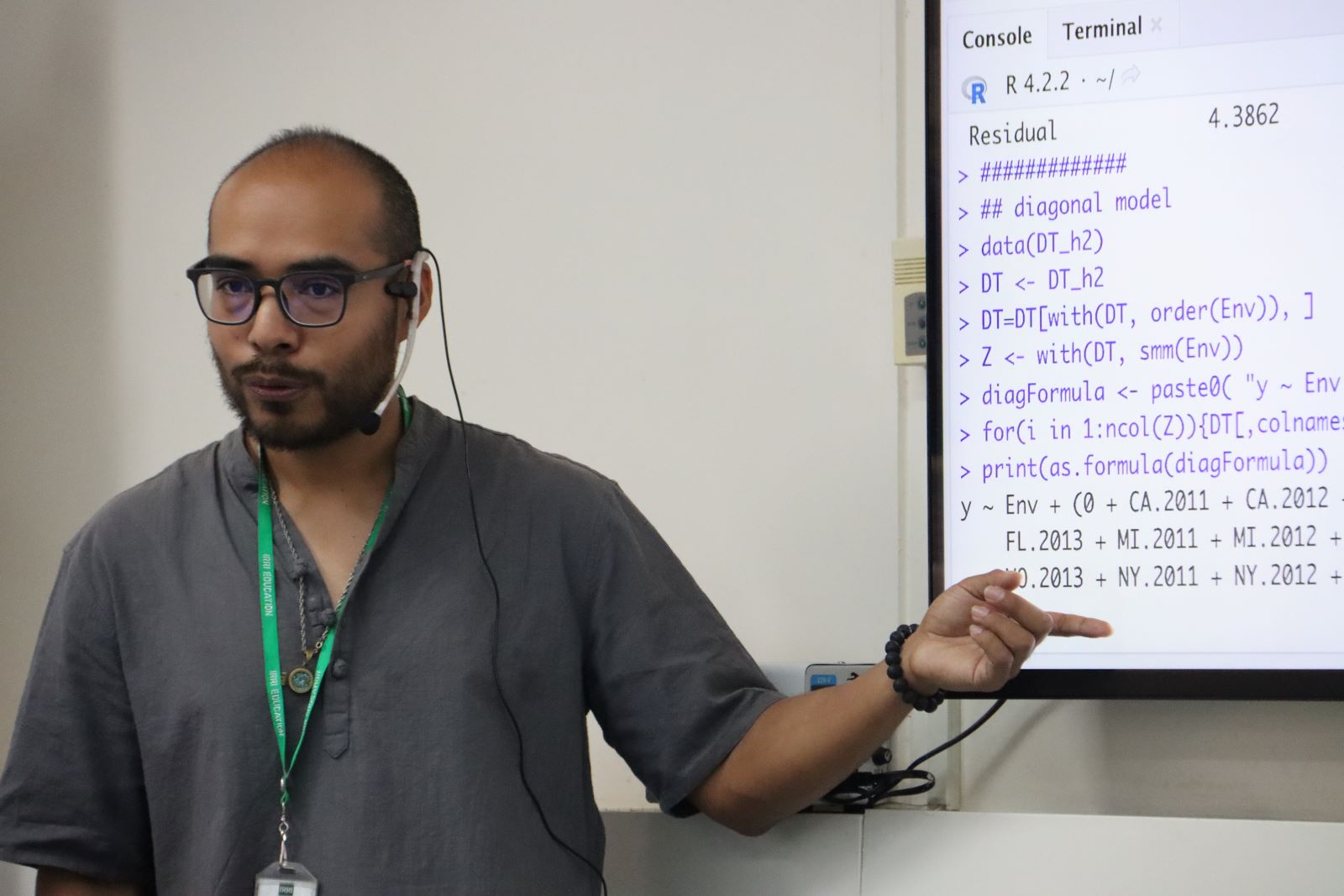
Over the course of five days, the participants engaged in intensive discussions involving theoretical concepts as well as practical and hands-on exercises. Structured into five modules, the training sessions covered topics on the R software and R markdown, quantitative genetics, statistical modeling in predictive genetics and breeding, implementation of genomic selection in plant breeding, dissecting G x E interactions and crossing strategies.
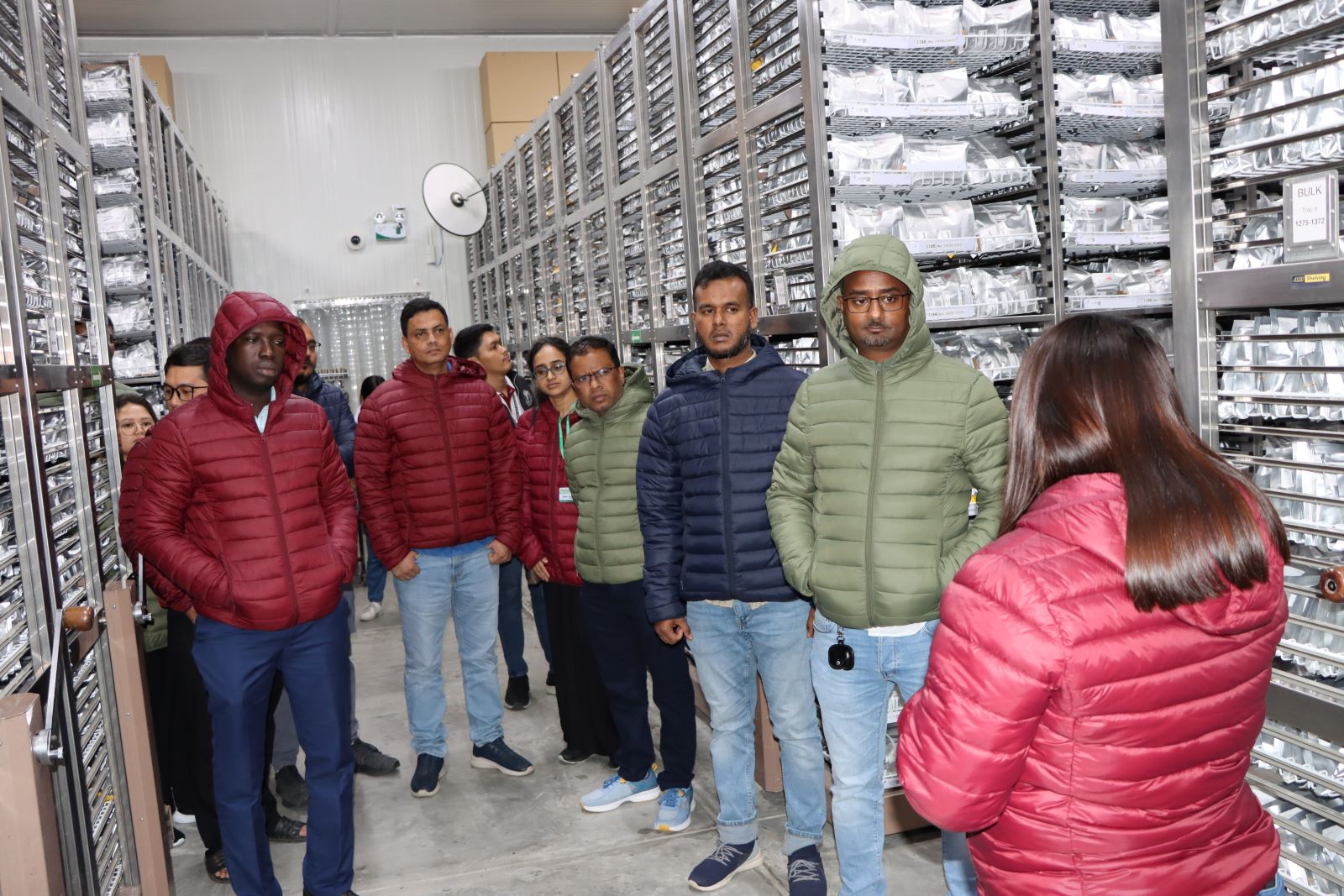
Apart from the classroom sessions where they interacted with the resource persons, the participants also had the opportunity to visit IRRI’s Genotyping Service Lab, which offers trait genotyping with over 100 validated SNP markers for 25 QTLs/genes related to biotic and abiotic stresses, grain quality and yield. They also visited the International Rice Genebank that holds more than 132,000 available accessions, making it the collection of rice genetic diversity in the world. This excursion allowed them to understand the scale and diversity of rice germplasm, which is crucial for applying genomic predictions and breeding methods effectively.
During the course closing program, all the resource persons expressed their gratitude to the participants. They echoed the same sentiments, assuring the participants that all of them are available in case any of them have any additional queries or if they are interested in collaborating.
Dr. Anilyn Maningas, Head of IRRI Education congratulated the participants for completing the intensive training. She hoped that they share the knowledge and skills they have been equipped with with their colleagues in their respective institutions.
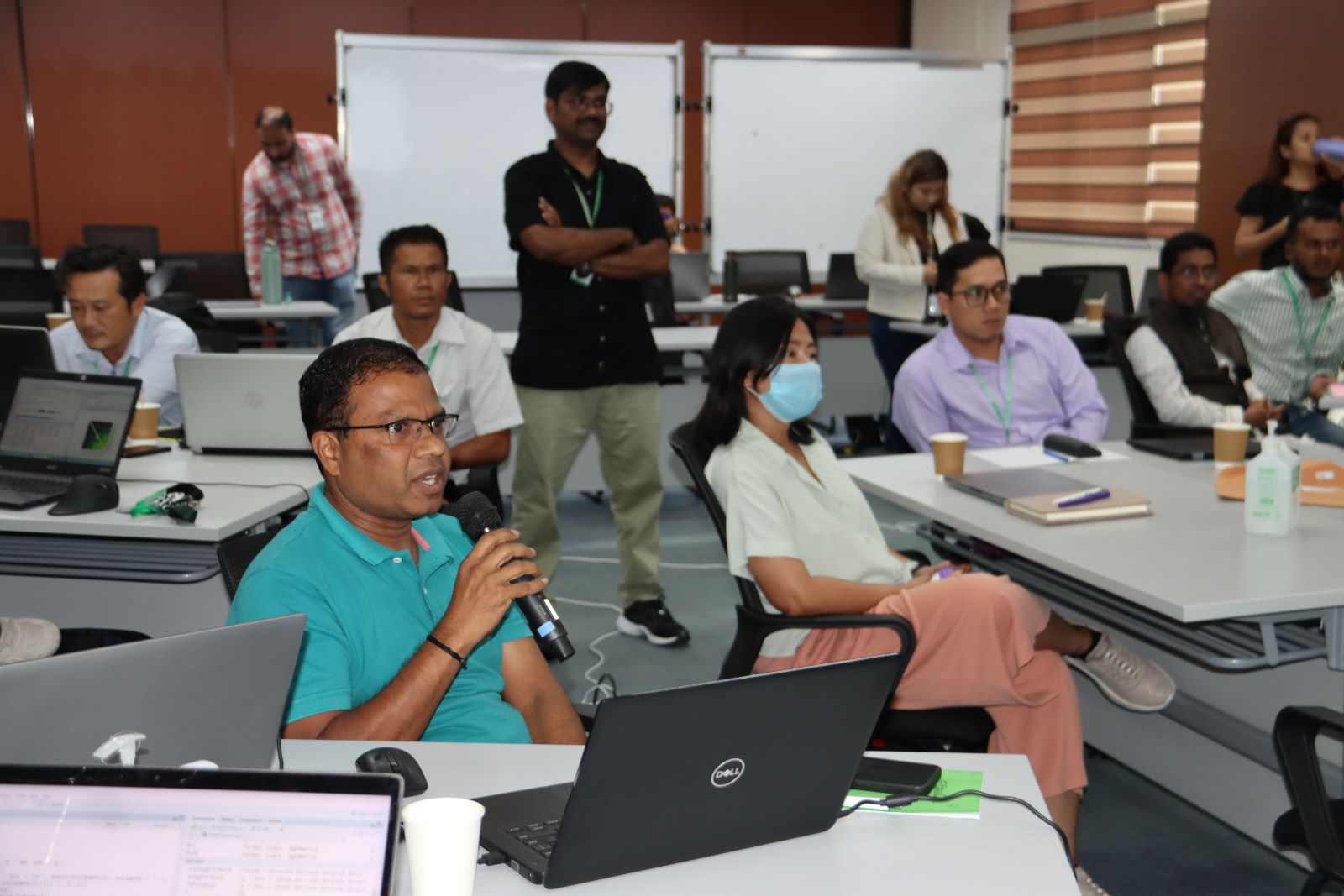
After the program, participants shared their thoughts, feedbacks, and key takeaways. Katreena Navea from IRRI headquarters remarked, “As someone involved in pre-breeding, my understanding and exposure to the comprehensive activities of the breeding programs is limited. The training course has significantly deepened my understanding of the modern breeding process and the theories behind it. Aside from the knowledge gained from the modules, the course has also been helpful in looking at the processes in a holistic perspective, and how our team’s pre-breeding efforts contribute and align to the overall goals IRRI’s breeding strategies”
Md. Moniruzzaman from IRRI Bangladesh commented, “We have received a lot of essential R scripts as well as soft copies of the training materials. Besides this, we also did hands-on practice and ran the analysis with demo data, which was very interesting and will be useful for my own program”.
Another participant shared, “[This is a] highly recommended course. All the RPs are well equipped and provide a practical approach on the modern breeding models and tools. It can improve one’s approach on conducting breeding programs”.
Learn more about this training course and other programs offered by IRRI Education, visit education.irri.org
IRRI Education: 60 Years of Empowering Women in Rice Science and Production through Education and Capacity Building
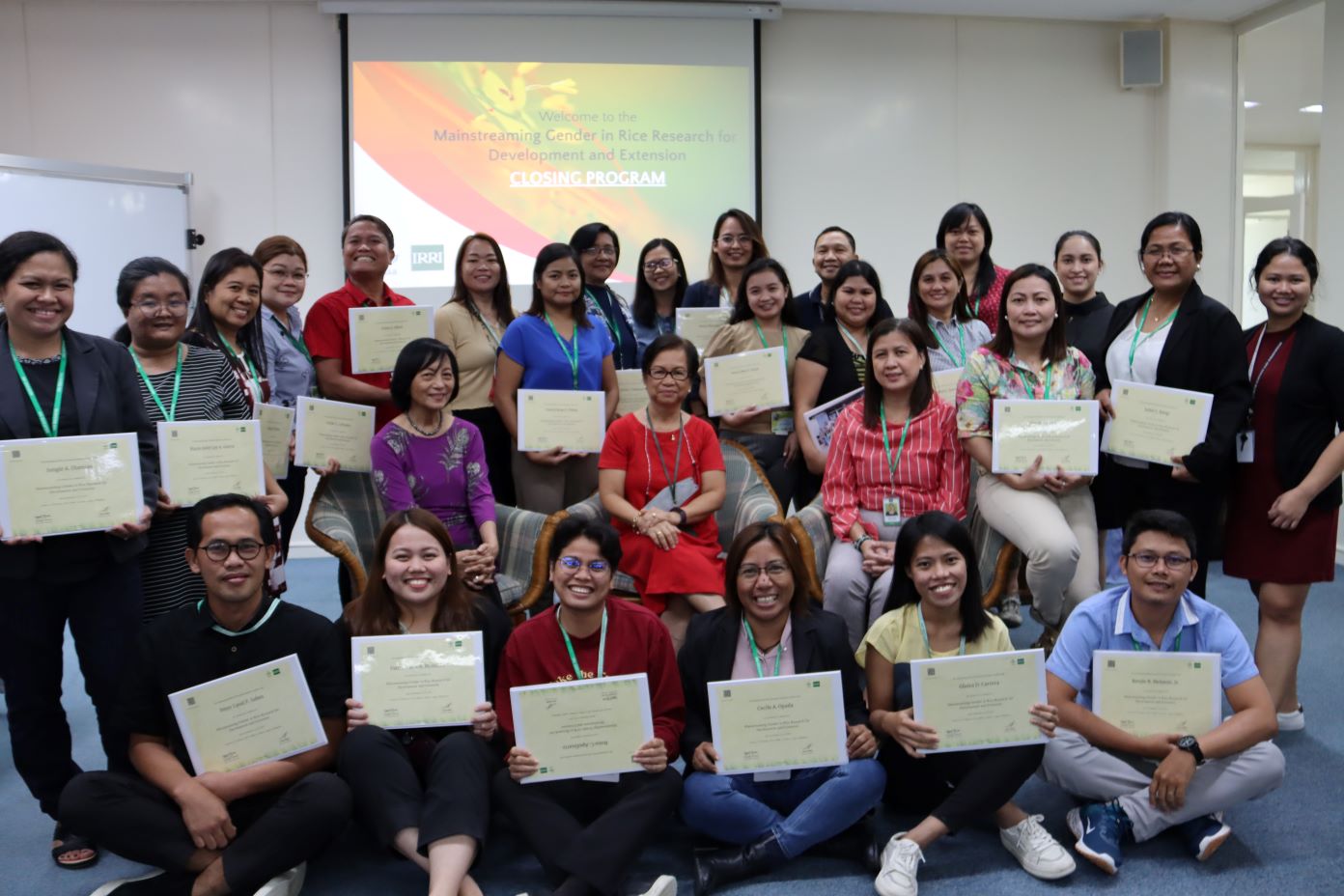
Women play a pivotal role in agriculture. In the rice sector, more than 500 million women around the world are engaged in rice cultivation. Similar to men, women are engaged in rice production, postharvest, and processing, yet they continuously face gender-specific obstacles that put them at a significant disadvantage due to limited access to resources, learning opportunities, and farming technologies.
Access to education, whether formal or non-formal, is fundamental in empowering women. Education equips women with the knowledge, skills, and self-confidence to achieve their life goals. However, inequalities remain in educational access between men and women in different parts of the world. According to recent data, 122 million girls remain out of school globally, mostly due to geographic location and poverty. The World Inequality Database in Education (WIDE) and the UNESCO Institute for Statistics reported 10 countries that showcased the inequalities faced by women and girls in education. In these countries, 7 in 10 of the poorest young women of upper secondary school age are out of school, while in Guinea and Mali, almost all poor young women are not in school.
The exclusion of women and girls from education is influenced by various factors which are particularly intensified in rural areas where agriculture serves as a primary source of livelihood. Investing in women’s education has a broader societal impact. According to UNESCO, making sure that women have access to secondary and tertiary education increases their agency and decision-making and elevates their prospects for decent work, thereby fostering economic growth on a global scale.
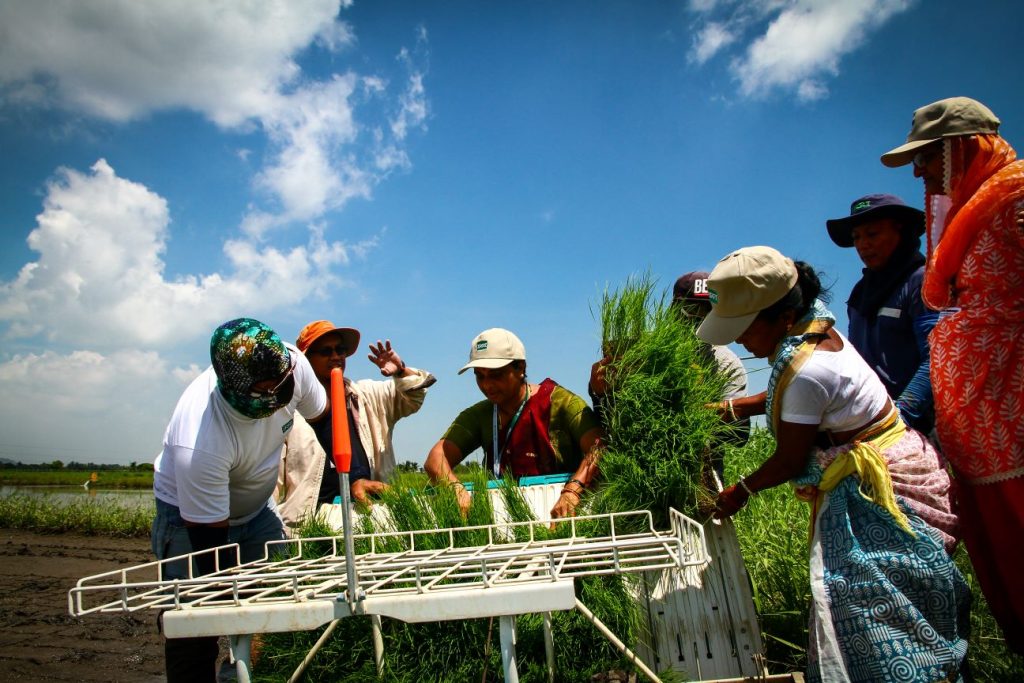
The International Rice Research Institute (IRRI) believes that women should have access to formal and non-formal education, especially in the field of rice science. As the institute’s educational and capacity-building arm, IRRI Education is at the forefront of making this happen by providing capacity development programs in various disciplines of rice science and technology. IRRI Education encourages the participation of women in its programs, specifically in its training courses and scholarship opportunities.
As one of the flagship programs of IRRI Education, short-term training courses have been offered since the establishment of the institution. These courses involve immersive engagements that focus on research, innovation, and knowledge and skills improvement. Through lectures with experts, hands-on learning, and on-field experiences, these training programs have empowered women, boosting their confidence and morale with their skills and competencies.
Notable training topics include rice breeding technologies, rice production, and postharvest technology, research data analysis and management, information technology, quality seed production, and pest and disease management. In recent years, a growing need to mainstream gender in rice research and technology has been identified. In response to this, IRRI Education designed and developed a training program that aims to educate participants with the importance of addressing social concerns including the gender dimension in agriculture and rice
research for development and extension. This training helps participants to learn how to integrate gender in rice research planning, implementation, monitoring, and evaluation as well as in leadership styles, and in the workplace. Additionally, through this training, they will be able to identify opportunities to contribute to the development of gender-responsive projects/programs.
Since 1964, more than 4,000 women have been trained under IRRI Education’s short-term programs, equipping them with the knowledge and skills in various aspects of rice science and research.
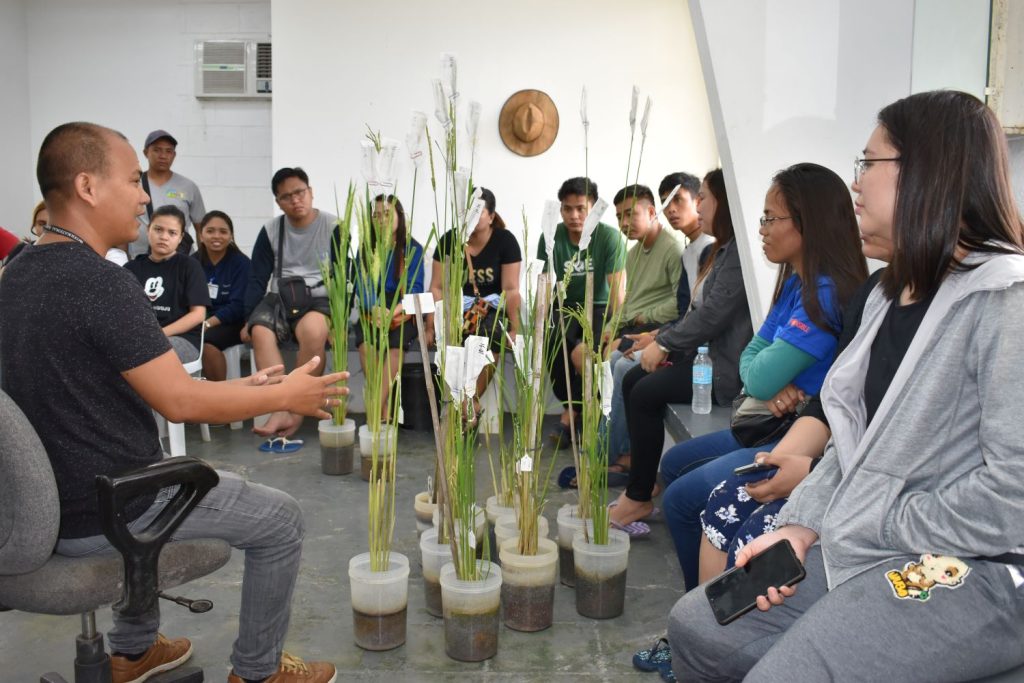
IRRI Education also engages women scholars and the youth through degree and non-degree programs. These programs allow qualified individuals to be involved in IRRI’s research platforms, working alongside world-renowned scientists. Since 1962, IRRI has hosted 5,181 scholars of which, 1,772 are women scholars coming from 92 countries around the world. This number is increasing continuously and is expected to soon close the gender gap. For the past five years, a total of 650 participants have completed various programs with IRRI, including students who conducted their research at the institute as well as oOn-the-Jobon-the-job Training (OJT) and internships. Out of the 650 participants, 52% consist of women.
Rice agriculture is continually facing dynamic and complex challenges and women are bearing the brunt of these. Still, the future holds immense opportunities for women and IRRI is dedicated to providing education and capacity building to continuously empower them to thrive in the dynamic field of rice production and science. However, this feat cannot be achieved by IRRI Education alone. There is a great need for collaborative efforts between the national systems, agricultural institutions, and donor organizations to invest in women to drive transformative change and bring about a brighter future for agriculture.
Echoing this thought, Dr. Anilyn Maningas, Head of IRRI Education shared, “Investing in women almost always creates a ripple effect in the sense that they can be very good role models for the family and the community where they are attached to. This could translate to ensuring a next generation that encourages and supports women that could easily extend to the generation to come”.
Grade School Students Enjoy Rice Planting Experience at IRRI
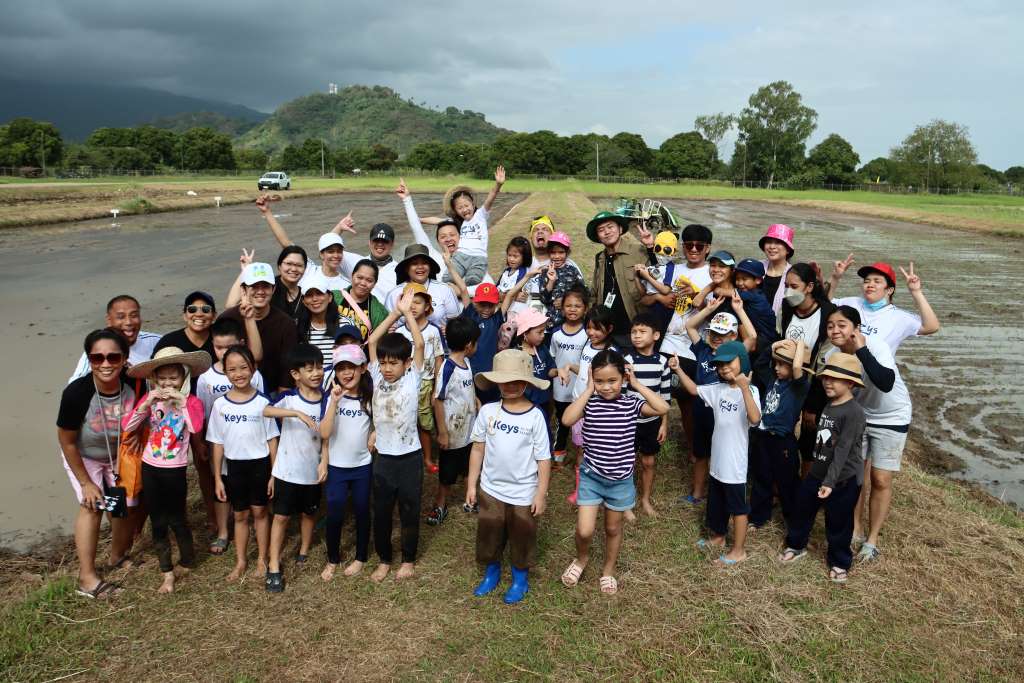
On 14 March, 26 Grade 1 students from Keys School Manila came to the International Rice Research Insitute’s (IRRI) headquarters in Los Baños, Laguna to participate in the Rice Planting Experience (RPEx) offered by IRRI Education.
Before the hands-on experience, the students were given a short lecture on the basics of rice production by IRRI Education’s facilitation team led by Mr. Aaron Paul Landicho. They were given a brief demonstration on various field activities such as seedbed preparation, pulling of seedlings, seed broadcasting, manual transplanting, and grid marking. Afterwards, the students went into the rice paddies to transplant rice seedlings using their bare hands.
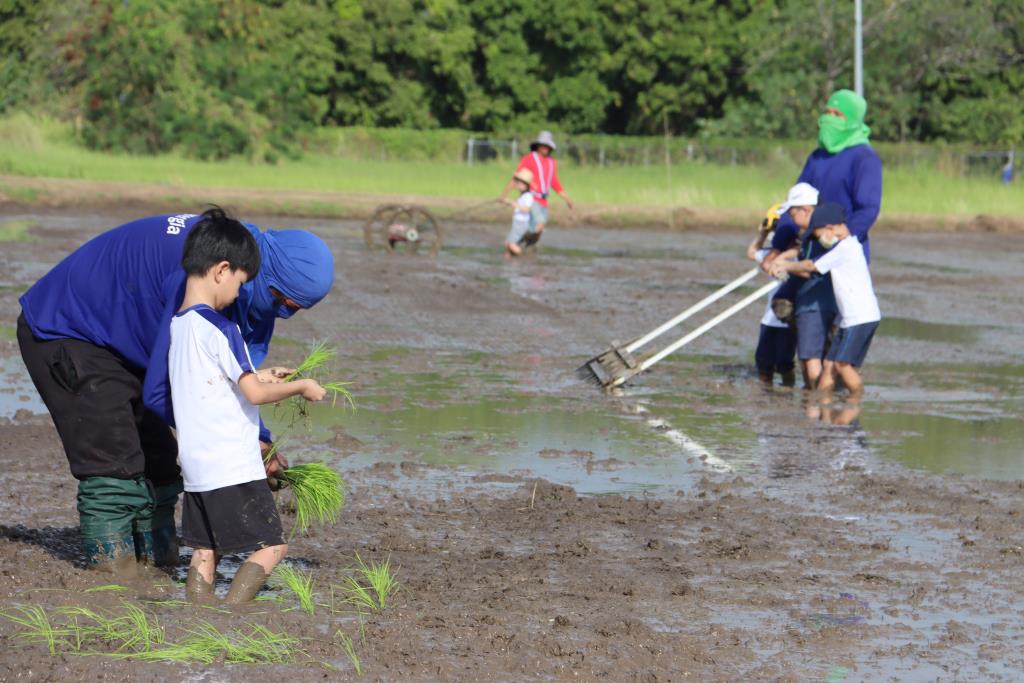
“The Rice Planting Experience program is specifically made for the youth, aiming to immerse them in the practical aspects of rice farming. Through hands-on activities, participants of the program not only gain insights into the significance of rice but also acquire knowledge about diverse rice planting methods,” Aaron quote about the program.
The unique and immersive activity allowed the students to experience the fun and thrill of preparing the land and planting rice using a blend of traditional and modern technologies. By getting their ‘feet wet’ in the fields, participants gain firsthand knowledge and experience of the essential work farmers do to ensure we have rice at our meal tables.
“As the Philippines witnesses a growing population of aging farmers, the need to engage younger generations in agriculture becomes increasingly vital. This is what the RPEx tries to address—help the young ones realize the significant role that farming plays in sustaining life and fostering development in the country,” Aaron quote encouraging participation in RPEx.
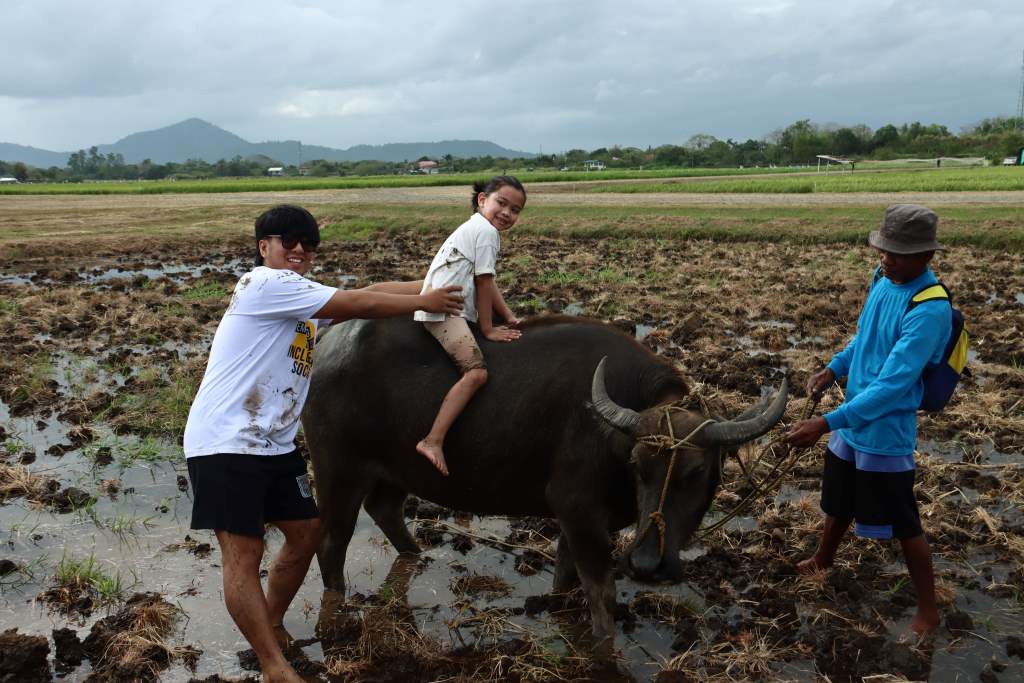
The agriculture sector is grappling with multiple challenges that demand the emergence of a new generation of agricultural champions. IRRI Education emphasizes the importance of exposing young minds to agricultural practices as a foundational step towards inspiring their participation and engagement in the field. The RPEx is one of IRRI Education’s initiative to expose young people to the world of agriculture.
Learn more about IRRI Education and its programs at education.irri.org or email us at education@irri.org
IRRI Education Conducts 2nd Batch of Training for UPLB Farm Workers and Machine Operators
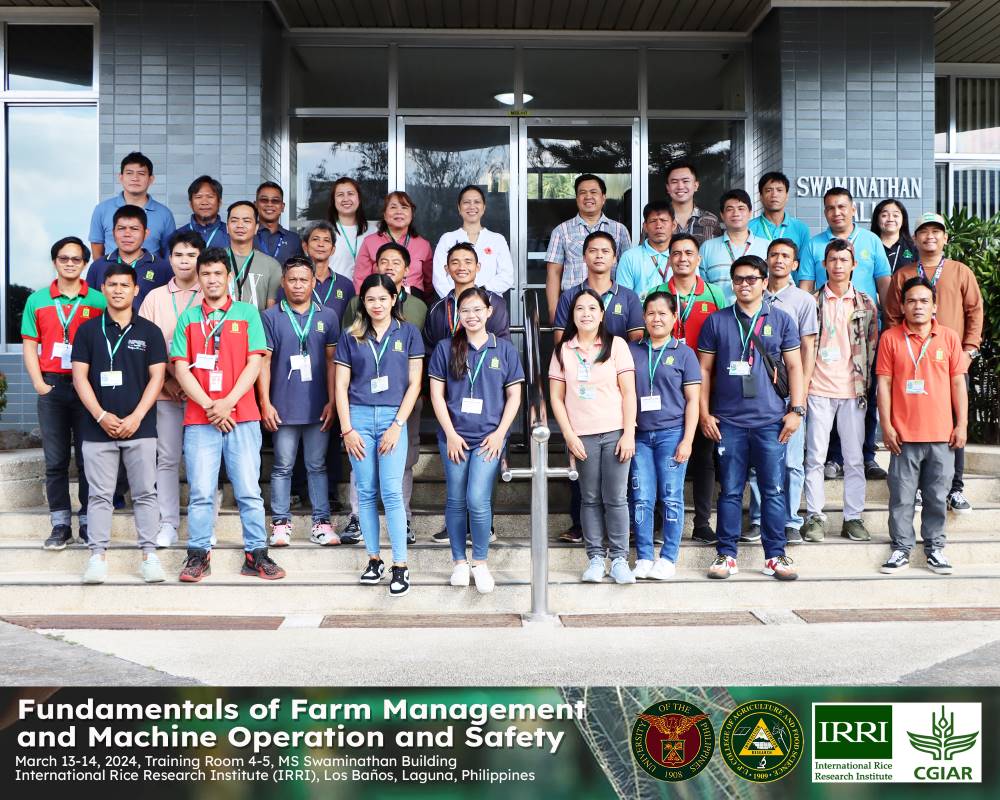
Following a successful training implementation last year, the International Rice Research Institute (IRRI) and the College of Agriculture and Food Science (CAFS) of the University of the Philippines Los Baños (UPLB) organized another training on the fundamentals of rice-farm management and operations and farm machinery maintenance tailored for technicians, farm workers, and heavy equipment operators from the Institute of Plant Breeding (IPB).
The two-day course is designed to equip participants with the fundamental knowledge and skills required in planning and operating rice farm machinery and equipment, incorporating lesson on the safe practices in operating agricultural machinery for rice production.
On March 13, during the opening program, Dr. Anilyn Maningas, Head of IRRI Education, welcomed the participants, outlining the different activities that they will be undertaking for the duration of the training. Concluding her message, Dr. Maningas urged the participants to actively participate in the discussions, engage with the resource persons, and to share their own knowledge and experiences with each other and with the IRRI team.
Following this, Dr. Adeliza Dorado, Associate Dean for Instruction of UPLB CAFS, also delivered a message stressing the significance of acknowledging the diversity among all involved in the training. She highlighted the inclusion of women participants in this year’s cohort, remarking, “Your participation underscores the invaluable contribution of women to agriculture, reinforcing the need for inclusive growth and equal opportunities in this vital sector”.
Ms. Ma. Lea Villavicencio, University Researcher and the Representative of the IPB Director, also gave a message expressing her gratitude for including staff from IPB into the training program. Echoing the message from Dr. Maningas, Ms. Villavicencio encouraged the participants to actively participate in insightful discussions with the resource persons, fostering a mutual learning environment.
In the course of two days, the participants will be exposed to an intensive program with activities involving lectures, discussions, demonstrations, and field visits, facilitated by IRRI experts in farm management and operations.
For more courses like this visit education.irri.org or email us at education@irri.org
Scaling Sustainable Rice Practices: IRRI Holds Online Training on SRP Standards and Performance Indicators
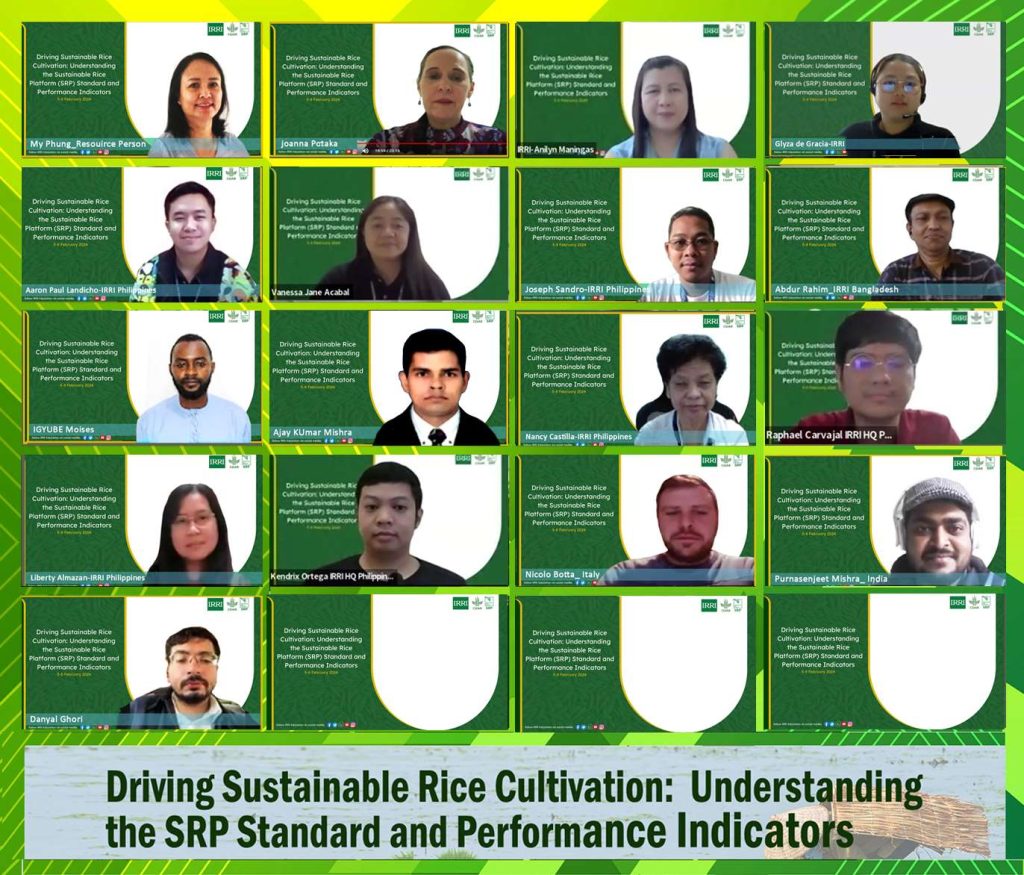
With the threat of climate change to the agriculture sector, specifically to rice production, switching to sustainable rice cultivation is the way forward. Sustainable rice production optimizes rice productivity, protects the environment, mitigates climate change impacts, and safeguards the livelihood of smallholder farmers.
The International Rice Research Institute (IRRI), as an authorized training provider of the Sustainable Rice Platform (SRP), recently delivered a four-day course on SRP Standard and Performance Indicators to 14 individuals from Pakistan, Italy, United States, Philippines, India, Nigeria, and Bangladesh.
IRRI Education, the educational and capacity building arm of IRRI, led the facilitation of the online training. Dr. Nguyen Thi My Phung, IRRI consultant, served as the resource person for the training. The course, entitled “Driving Sustainable Rice Cultivation: Understanding the SRP Standards and Performance Indicators”, is a training-of-trainers course intended to capacitate individuals to help scale capacity building on the SRP Standards and Performance Indicators on-the-ground globally. Topics covered include an introduction to sustainable rice; the SRP Standards,covering the standard’s conceptual framework and the 41 requirements; the SRP Performance Indicators, which also covered the conceptual framework, the 12 SRP Performance Indicators, and how to use the performance indicators to measure impact; and an introduction to the SRP assurance scheme.
At the end of the course, participants were expected to understand the purpose of the SRP instrument, how they are linked, and how they can be used together to drive sustainable rice cultivation; and gain understanding of application of SRP Standard and Performance Indicators to meet targets of SRP outreach projects. The course was delivered purely online through a mixed modality of synchronous and asynchronous discussions and self-paced e-learning activities, utilizing IRRI Education’s Learning Management System.
Participants have expressed their enthusiasm in joining the course and the learning outcomes they have gained. “I enjoyed all the sessions during SRP training, especially the discussion in the breakout rooms and the presentations. It was all very interactive even though it was online”, commented Mr. Purnasenjeet Mishra.
Another participant, Ms. Maria Liberty Almazan, shared how much she has gained from the training from having no knowledge at all about SRP. She expressed that she now has the knowledge and skills to verify if a farmer’s way of rice farming is compliant to the SRP Standards by measuring the impact of his adoption of good farming practices.
Driving Impact and Scaling Sustainability
The SRP Authorized Training Program offers guidance, training and technical assistance to extension services, implementation partners and farmers to support upscaling sustainable practices. The SRP Standards and Performance Indicators course is designed to build a cadre of persons qualified to conduct farmer outreach, training, and verification activities in support of SRP objectives.
After successfully taking the course and the subsequent certification examination, participants were awarded the SRP Accredited Trainer certification which qualifies them to deliver training on the topic of the SRP Standard and Performance Indicators at scale.
“SRP is really underutilized in Nigeria. This training has provided me an opportunity to train smallholder farmers to keenly follow SRP Standards in rice production”, remarked Mr. Moses Igyuve, a participant from Nigeria.
“I recommend this course to those who are engaged in rice research. It is a valuable resource because it will help promote and improve the understanding and adoption of the standards for SRP in research projects and eventually the scaling in farmers’ fields. The course also provided me with insights on how crop protection specialists can contribute to the improvement of performance indicators for pest management.” said Dr. Nancy Castilla, a Senior Associate Scientist at IRRI Philippines..
About the Sustainable Rice Platform
The Sustainable Rice Platform is a global multi‐stakeholder alliance comprising over 100 institutional members from the public, private, research, civil society and the financial sector. SRP is registered as a not-for-profit member association working to transform the global rice sector by improving smallholder livelihoods, reducing the social, environmental and climate footprint of rice production, and by offering the global rice market an assured supply of sustainably produced rice.
SRP was originally co-convened in 2011 by IRRI and the United Nations Environment Programme (UNEP), together with research and private sector partners. It was established with the goal of promoting best practices in rice farming that are environmentally friendly and socially responsible, while boosting yields for both commercial and subsistence farmers.
IRRI became an Authorized Training Provider for the SRP Standard and Performance Indicators in 2020.
Interested to join an SRP authorized course by IRRI? Send us an inquiry at education@irri.org
Rice Characterization and Digital Data Collection Training Held at Tanzania
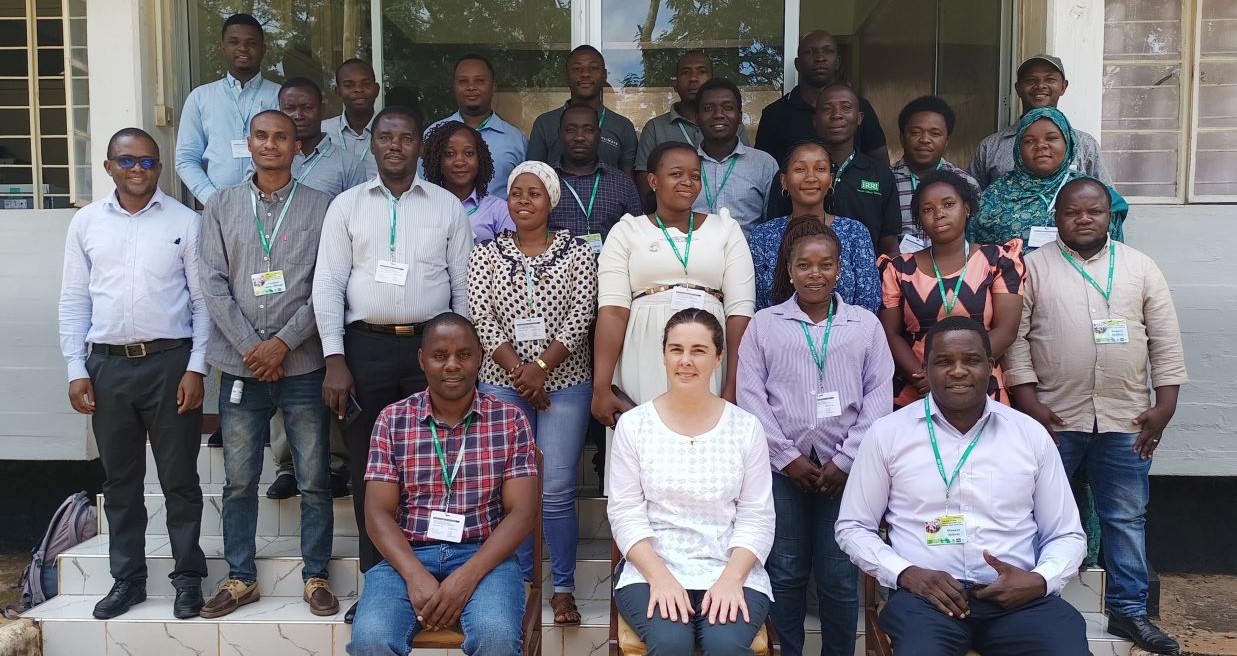
On November 14 and 15, the International Rice Research Institute (IRRI) in partnership with the Sokoine University of Agriculture (SUA), conducted a training workshop aiming to provide an overview of rice abiotic stress trials and the benefits of digital data collection. This program is an initiative under the Climate Smart African Rice Project in Morogoro, Tanzania, aimed at developing varieties tolerant to abiotic stresses such as flooding, salinity, and germination under anaerobic conditions.
The training was held at SUA, Morogoro, Tanzania and was participated by undergraduate and graduate students of the university as well as technicians and field staff from the Tanzania Agricultural Research Institute (TARI). Throughout the 2-day program, the participants attended lectures on environmental characterization, relative growth rate, taking measurements using the Fieldbook app, stress screening protocols, and examples from physiology research. Aside from this, they also participated in several demonstrations in screenhouses on the use of rain gauge and soil hand texturing.
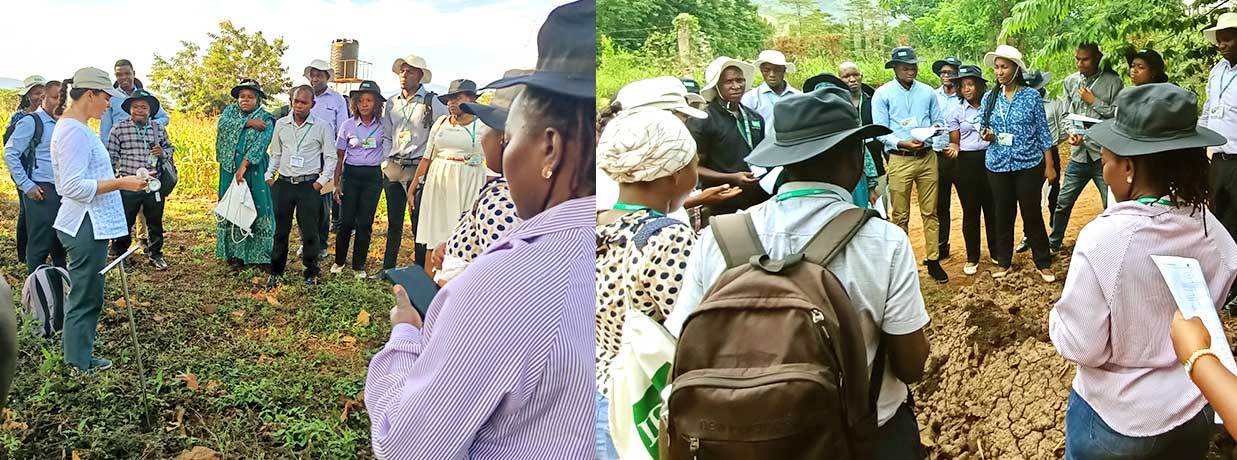
One of the highlights of the training was the hands-on activity where participants got to apply what they have learned in the lectures and discussions with the experts. Working in groups, the participants collected data in the screenhouses, formatted the data, calculated the relative growth rate (RGR), compared genotypic means by ANOVA, and visualized data with a bar graph using the R software. Notably, all analysis was done directly from the plant to the computer with no use of paper and pencil for data recording.
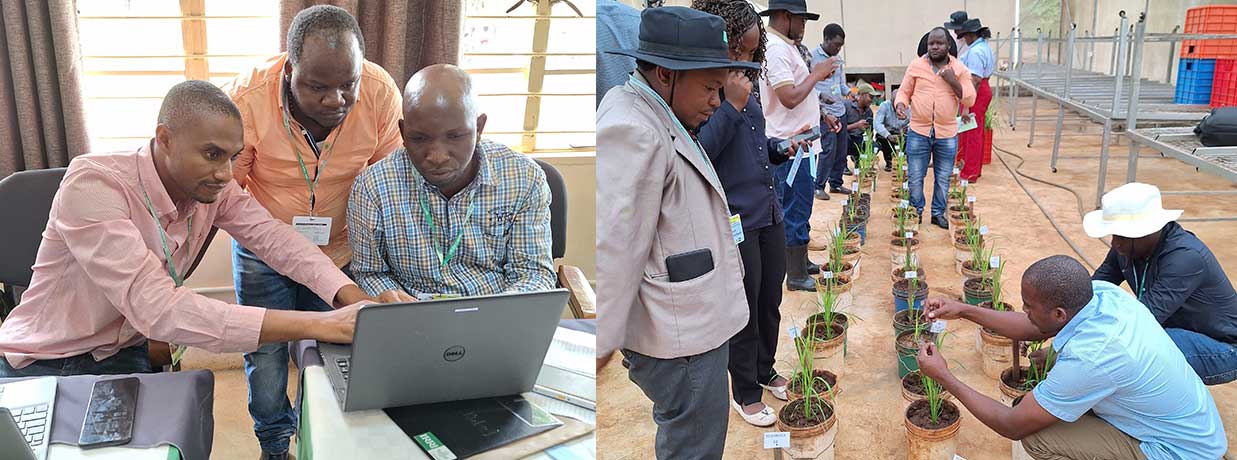
Participants also expressed their appreciation for the training. “I thank IRRI Education for this valuable training. The training was useful and has enlightened me with the knowledge and skills on rice characterization and digital data collection and will help my institute collect good quality data in our stress trials,” said Mr. Zakayo Machunde. Another participant Mr. Kalegi Nzingula Hamis noted, “I am thankful for the training because now I have added skills that will increase my working performance in my organization.”
Capping the sharing of testimonials, Mr. Paulo Sulle remarked “I highly recommend continuation of this type of courses to other scientists so to further strengthen the research capacity in the region”.
Farm workers, machine operators from UPLB trained on fundamentals of farm management and machine operations
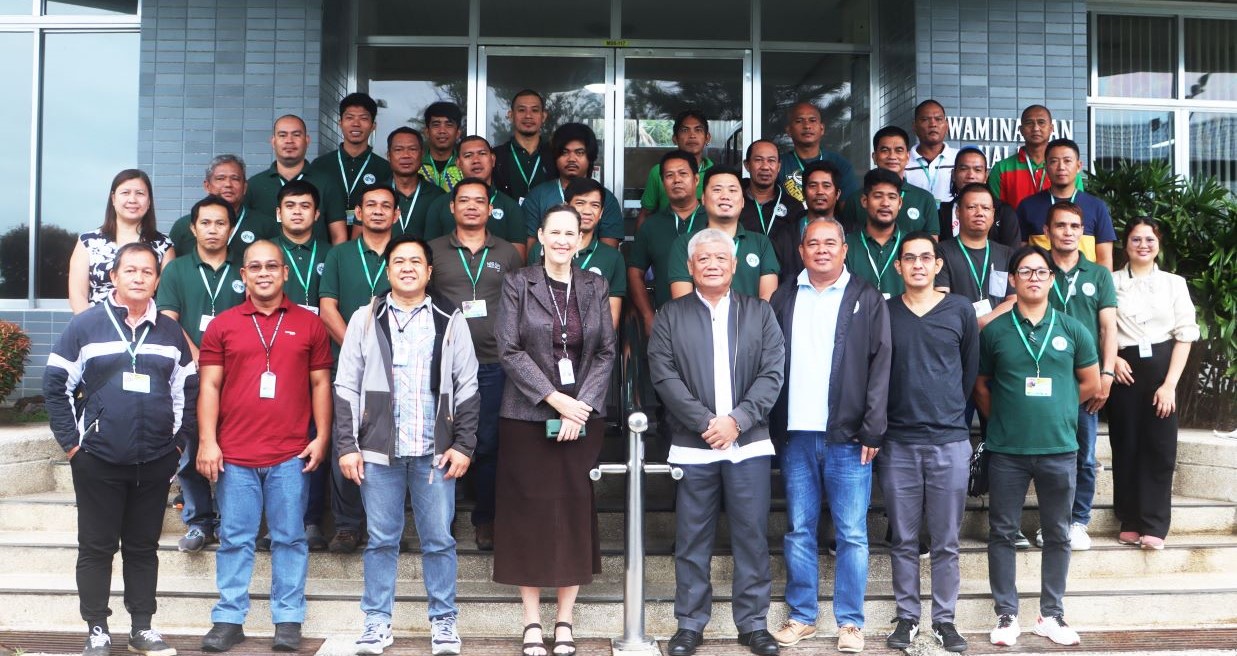
The International Rice Research Institute (IRRI) and the College of Agriculture and Food Science of the University of the Philippines Los Baños (UPLB) organized a 2-day training on the fundamentals of rice-farm management and operations and farm machinery maintenance.
From November 16 to 17, 30 technicians, farm workers, and heavy equipment operators from UPLB were at the IRRI headquarters to learn the basic knowledge and skills required in planning and operating a rice farm and maintaining rice farm machinery and equipment. The training will also highlight safe practice in operating agricultural machinery for rice production.
During the opening program, Gopesh Tewari, Head of IRRI Education, welcomed the participants. He talked about the role of machineries and mechanization in agriculture and how, moving forward, this would still play a part for agriculture 4.0. Ending his message, he urged the participants to interact and participate in dialogues with different IRRI scientists and resource persons of the program to enhance their knowledge and skills that they can bring back to UPLB.
Meanwhile, Joanna Kane-Potaka, IRRI’s Deputy Director General for Strategic Engagement and Impact, talked about the core mission of IRRI and the imperatives that goes along with it, focusing on climate change adaptation and mitigation and nutrition and food security. She also shared about the ongoing collaboration between IRRI and UPLB and how the current training is a testament of these efforts. Ending her message, she posed a challenge to the participants, “as you go through this course, look for opportunities how what you’re doing and what IRRI is doing, how we may be able to work together more. If you can identify anything we’re really keen to collaborate more and look for opportunities there.”
The dean of UPLB’s College of Agriculture and Food Science, Elpidio M. Agbisit, Jr., was also present during the program where he emphasized the importance of the training for the participants whom he considers as the backbone of their college. “This is the opportunity for you to acquaint yourself with the future of agriculture and we have to adjust so that we can [still] be relevant. I hope that everybody will listen, learn, and apply the knowledge that you will gain from this [training]”.
In the span of two days, the participants attended lectures on land preparation, crop establishment, water management and pest management, rice harvesting and post-harvest operations, and power sources in the farm. Aside from these, they also had hands-on training on farm machine maintenance and safety protocols for operating rice farm equipment. Moreover, they visited key IRRI facilities such as the Zeigler Experiment Station, where they observed the operations of post-harvest machineries; the IRRI Plant Growth Facility; and the IRRI Genebank.
IRRI Education showcases capacity development initiatives at the 6th International Rice Congress (IRC2023)
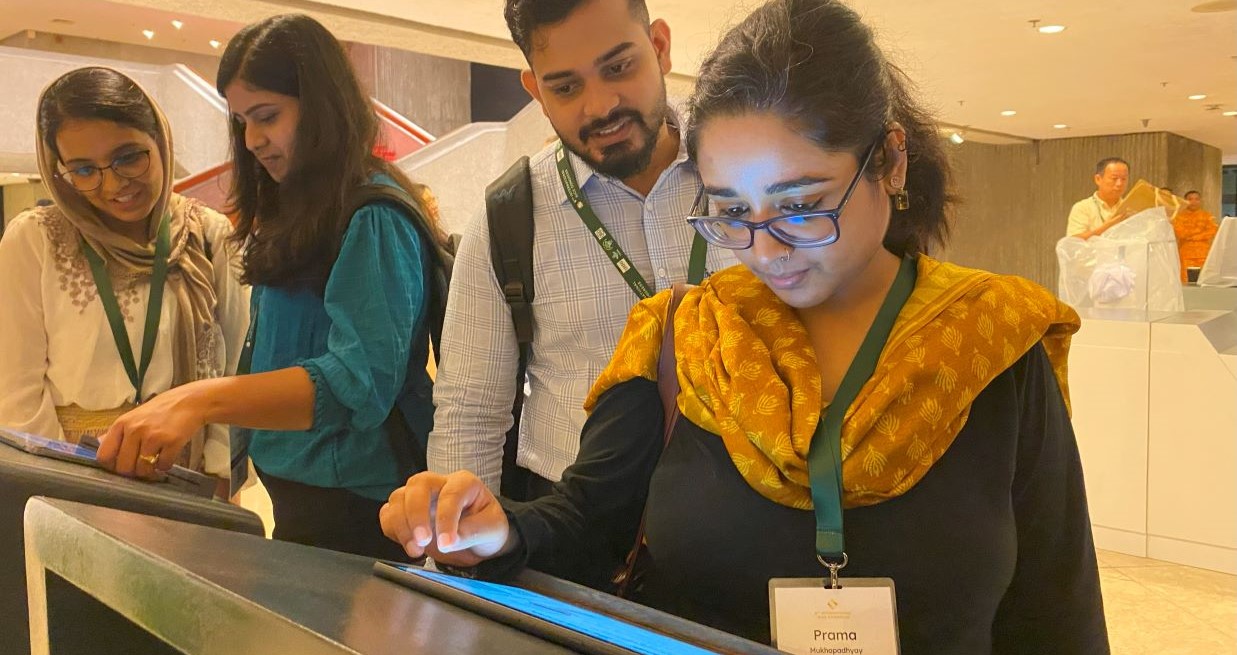
IRRI Education, the educational arm of the International Rice Research Institute (IRRI) participated in the 6th International Rice Congress (IRC2023) last 16-19 October 2023, showcasing the innovations in capacity development and knowledge sharing.
The Rice Congress, held every four years, brings together scientists, policymakers, experts, and the private sector to discuss global rice trends and the changes and challenges in the agri-food sector. This year, the congress was held at the Philippine International Convention Center (PICC) in Manila.
During the four-day event, IRRI Education showcased its offerings through their state-of-the-art booth which offered interactive displays that reveals information about IRRI Education and its flagship services.
Riding on IRRI’s research and innovation, IRRI Education currently operates with five service portfolios – Short & Long Courses, Scholars & Youth Engagement, Online Learning & Product Development, Knowledge Sharing, and Advisory around Capacity Development – all of which underpin the commitment to producing holistic and integrated learning solutions, addressing learning gaps and expectations with sound educational innovations for global south.
Some of the highlights of the interactive display were the featured micromodules, where IRC delegates can simulate taking some of micromodules available in IRRI Education’s Learning Management System (openlearning.cgiar.org); the upcoming courses section, where they can see dates and application links to the courses lined up for the months of October to December of this year; the available scholarship section, where interested students can check out the opportunities available for them; and the videos in every section of the display, where IRRI Education showed the highlights and impacts of its programs.
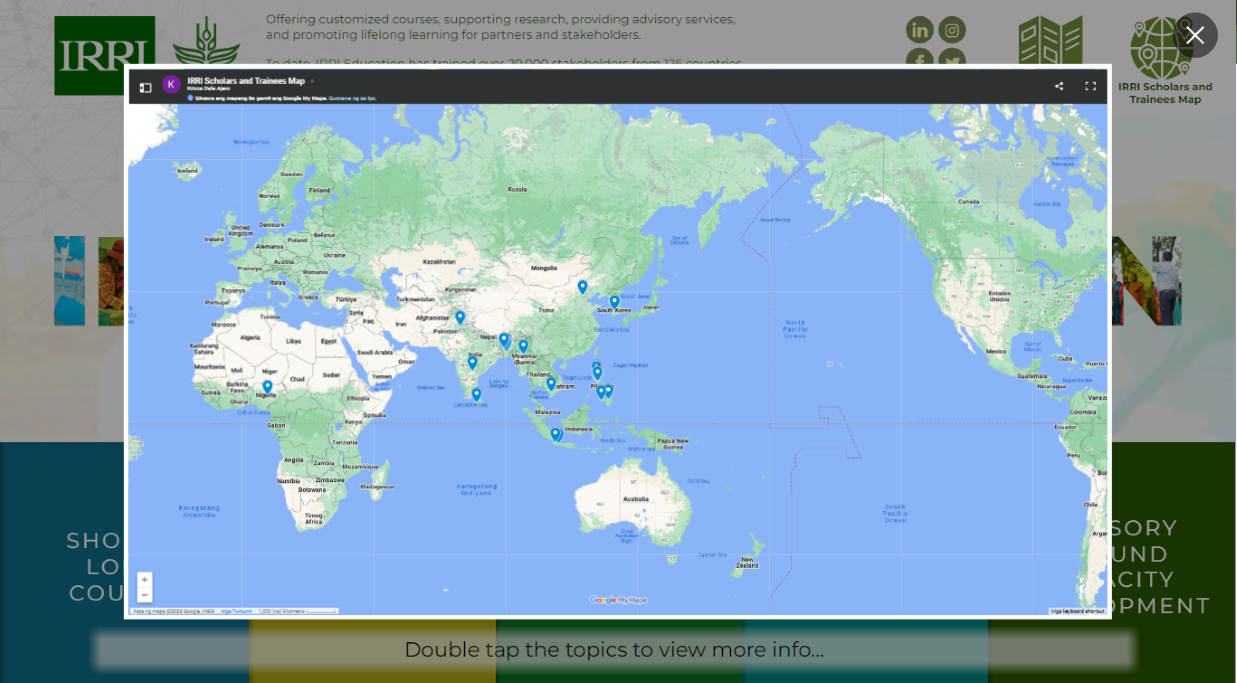
IRRI alumni were also engaged through the feature dubbed as the IRRI Alumni Map. Previous scholars and trainees had fun pinning their locations in the map and connecting with other alumni from the same area as them. Aside from the interaction with the scholars, the map was designed to show the diversity of the IRRI Education alumni network.
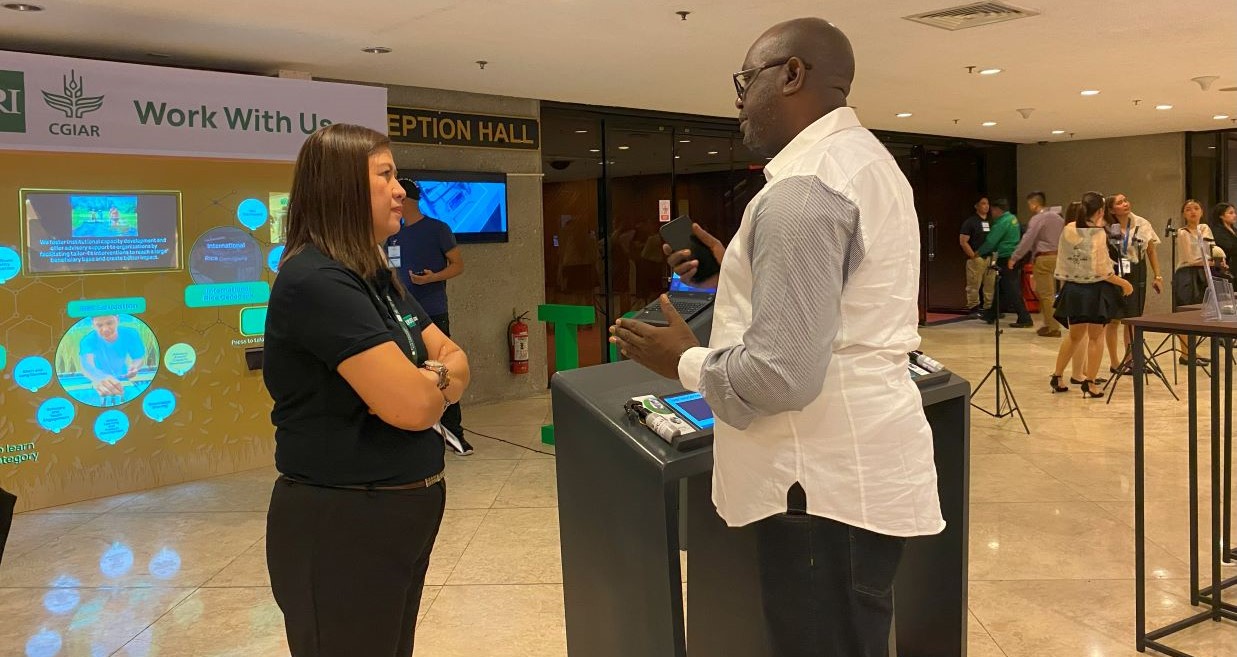
For the duration of the congress, IRRI Education engaged in meaningful conversations with the attendees, ranging from scientists and researchers, leaders and policymakers, members of the private sector to students and local farmers. These conversations are expected to shape and inform the current and future program offerings of IRRI Education to align with the demands of its stakeholders.

